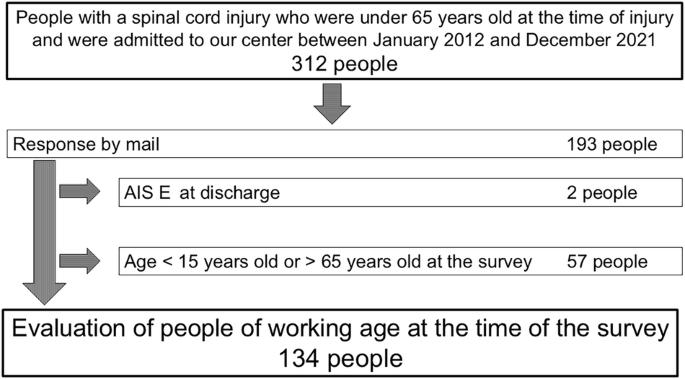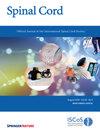影响日本脊髓损伤后重返工作岗位的因素:一项横断面研究。
IF 2.2
4区 医学
Q3 CLINICAL NEUROLOGY
引用次数: 0
摘要
研究设计:调查。目的:本研究旨在调查日本脊髓损伤患者重返工作岗位的比率,并确定与他们重返工作岗位相关的因素。环境:脊髓损伤患者很难重返工作岗位,尽管这有助于他们的个人生活质量和社会。之前的研究已经调查了阻碍重返工作岗位的各种因素,但没有一项研究涉及社会参与。方法:对工作年龄的脊髓损伤患者进行问卷调查。采用视觉模拟疼痛量表对患者的就业状况、婚姻状况、神经系统状况、日常生活活动、运动和/或爱好的享受以及是否与家人一起生活进行了检查。结果:在134名受访者中,有61名(46%)在调查时在职。多因素logistic回归分析显示,轻度瘫痪、运动和/或爱好的享受是与重返工作相关的显著因素。在就业人员中,27%的人通过私人介绍找到了工作,这凸显了社会关系在促进就业方面的作用。结论:除了轻度瘫痪外,社会参与运动和/或爱好与重返工作显著相关。由于社会关系可以提供获得工作的机会,通过体育和爱好提供互动空间,可以创造一个有利于重返工作岗位的环境。本文章由计算机程序翻译,如有差异,请以英文原文为准。

Factors affecting return to work after spinal cord injury in Japan: a cross-sectional study
Survey. This study aimed to investigate the rate of return to work among individuals with spinal cord injuries in Japan and identify factors associated with their return. Returning to work is difficult for people with spinal cord injuries, although it contributes to their personal quality of life and society. Previous studies have examined various factors inhibiting return to work, but none have examined social participation. Questionnaires were sent to individuals of working age with spinal cord injuries. Their employment status, marital status, neurological status, activities of daily living, enjoyment of sports and/or hobbies post-injury, and whether they lived with family were examined using the visual analog scale for pain. Among the 134 respondents, 61 (46%) were employed at the time of the survey. Multivariate logistic regression analysis revealed that mild paralysis and enjoyment of sports and/or hobbies were significant factors associated with return to work. Among those employed, 27% secured jobs through private job introductions, highlighting the role of social connections in facilitating employment. Besides mild paralysis, social participation in sports and/or hobbies was significantly associated with a return to work. As social connections can provide opportunities to obtain jobs, providing spaces for interaction through sports and hobbies, can create a conducive environment for returning to work.
求助全文
通过发布文献求助,成功后即可免费获取论文全文。
去求助
来源期刊

Spinal cord
医学-临床神经学
CiteScore
4.50
自引率
9.10%
发文量
142
审稿时长
2 months
期刊介绍:
Spinal Cord is a specialised, international journal that has been publishing spinal cord related manuscripts since 1963. It appears monthly, online and in print, and accepts contributions on spinal cord anatomy, physiology, management of injury and disease, and the quality of life and life circumstances of people with a spinal cord injury. Spinal Cord is multi-disciplinary and publishes contributions across the entire spectrum of research ranging from basic science to applied clinical research. It focuses on high quality original research, systematic reviews and narrative reviews.
Spinal Cord''s sister journal Spinal Cord Series and Cases: Clinical Management in Spinal Cord Disorders publishes high quality case reports, small case series, pilot and retrospective studies perspectives, Pulse survey articles, Point-couterpoint articles, correspondences and book reviews. It specialises in material that addresses all aspects of life for persons with spinal cord injuries or disorders. For more information, please see the aims and scope of Spinal Cord Series and Cases.
 求助内容:
求助内容: 应助结果提醒方式:
应助结果提醒方式:


